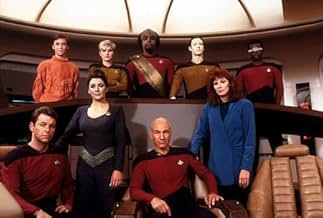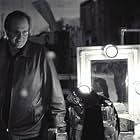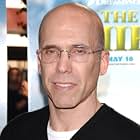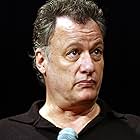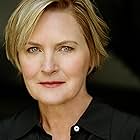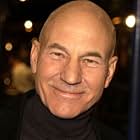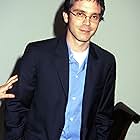IMDb RATING
7.0/10
1.4K
YOUR RATING
The story of the struggle to create the television series, Star Trek: The Next Generation (1987).The story of the struggle to create the television series, Star Trek: The Next Generation (1987).The story of the struggle to create the television series, Star Trek: The Next Generation (1987).
- Awards
- 2 wins & 1 nomination
D.C. Fontana
- Self - Writer & Script Consultant, Star Trek: TOS
- (as Dorothy 'D.C.' Fontana)
Herman F. Zimmerman
- Self - Original Set Designer, Star Trek: TNG
- (as Herman Zimmerman)
- Director
- Writer
- All cast & crew
- Production, box office & more at IMDbPro
Storyline
Did you know
- TriviaAccording to an interview with Larry King, William Shatner's original title for this documentary was "Wacky Doodle". He heard the phrase used by one of the show's writer-producers, to describe the intensity of the conflicts that occurred during the making of "Star Trek: The Next Generation".
- Quotes
William Shatner: Did you realize that the Next Generation it possible to characterize it as Gene Roddenberry's dream of Heaven?
Brannon Braga: I would never have thought that at the time, but now that we're talking, with his conception of the future and human beings in the future and Q, Q is GOD. Just look at the character, look at everything about the character
- ConnectionsReferenced in Half in the Bag: Star Trek Beyond (2016)
Featured review
Old school Kirk and Spock era Star Trek, if you follow the plots, are essentially police stories codified or dressed up as aliens, monsters and spaceships. The stories you are seeing are essentially law enforcement, security and the occasional health story of how police and other first responders encounter and deal with psychopaths, megalomaniacs, psychotics, or regular people who were smarter than average criminals and flaunted social convention.
You are essentially seeing police tactics and psychiatric regimes of how to tackle and sometimes treat people who have a leg up on everyone else, and are going to cheat, steal, or even kill their way to the top to get what they want.
So, when I watch this documentary and listen to the contradictory opinions and stories of who Gene Roddenberry was, what was happening, and who did what with what impact, I shrug my shoulders. When I worked on films and video one of the habits from everyone was to tell a story regardless of how truthful or dishonest it was. And that's the vibe I get off of this documentary.
Pretty much most of film and TV are like that, but with science fiction the idea is to inspire the smarter and more imaginative audience members to consider careers in law enforcement, military, medicine, or even intelligence services.
Original Trek was created in the wake of the end of the second world war and during the Cold War. And the Enterprise was the police cruiser that went around administering justice and law with some health overtones. Star Trek the Next Generation was essentially a giant therapeutic wing of a hospital where there were no problems, and that the audience was essentially the patient. My take is that once a fan had seen an episode that reflected their issues, they would leave and no longer be a fan. The pot served the subplots which became the focus.
What does this all mean? It means that this documentary, from my perspective, and what I've written here, was and is all smoke and mirrors trying to mask a mass hospital agenda that the production had for the audience. If you ever visited a private mental hospital everything is antiseptic and "perfect", where there are no problems and where there are no conflicts to facilitate the patients. And that's what the Enterprise-D was and is.
Ergo all of the stories about infighting, to me, are just more fodder fed to what fans this show has left, to mask the true agenda.
You know, I'm really just all Trekked out. This fictional property will never get back to the great writing it had in the 1960s. How anyone can watch Star Trek the Next Generation and be a fan of it, is just beyond me. But, all those sociologists and psychiatrists must know what they're doing, because apparently people like turning off their brains for TV and absorbing anything that gets presented to them.
So, remember, old Trek was a police show. New Trek in 89 was a primer for a younger and broader audience as a preparatory measure for the net connecting the world socially. Anything that tries to explain both flavors of Trek is just garbage, an effort at smoke and mirrors to obscure the true objective of the show.
Seeing Shatner interview people about so-called back stage dramas, again it comes across disingenuous. Part of undercover police work is to be able to act and tell a good yarn to get witnesses and perpetrators to reveal what they know. And that's kind of what film and TV are all about.
As a former wide eyed fan of the show, some of the happiest times I ever had were as a boy and young film major watching reruns of old Trek, and trying to come to terms with the new show in 89. After two writers' strikes, the first of which is mentioned in this documentary, and having seen personality conflicts and dramas for a TV show or two that were shot locally in San Francisco, the happiest day of my life was when I left a world of deception for the sake of it, a lot of which was to keep out anyone who had any ideas of misusing media for personal agendas.
Had I known now what Trek was really all about, in both of its iterations, I would have never had "stars in my eyes" about making my own Star Trek like show with a different setting, different technology, and just a different fiction altogether. But, I can watch this show without the acid flowing in my gut that I used to experience everyday I worked.
I didn't like Star Trek the Next Generation when it aired, hated it all these years, and now I understand why, and it took someone like Shatner to present to me the deceptive truth of how modern Trek was formulated with a bunch of fictional accounts of personality clashes. Oh well.
Should you watch it? Only if you're a die hard fan and think that this documentary will enhance your knowledge and pleasure of the fiction. As for me, well, knowing my parents [probably met mister Roddenberry, and helped contribute to the show's genesis, I can safely wave goodbye to the fiction.
P.s. The mysterious figure who didn't know how to write scripts but kept screwing with everyone's work, was probably a child psychologist and psychiatrist. Because that's all TV shows are all about.
You are essentially seeing police tactics and psychiatric regimes of how to tackle and sometimes treat people who have a leg up on everyone else, and are going to cheat, steal, or even kill their way to the top to get what they want.
So, when I watch this documentary and listen to the contradictory opinions and stories of who Gene Roddenberry was, what was happening, and who did what with what impact, I shrug my shoulders. When I worked on films and video one of the habits from everyone was to tell a story regardless of how truthful or dishonest it was. And that's the vibe I get off of this documentary.
Pretty much most of film and TV are like that, but with science fiction the idea is to inspire the smarter and more imaginative audience members to consider careers in law enforcement, military, medicine, or even intelligence services.
Original Trek was created in the wake of the end of the second world war and during the Cold War. And the Enterprise was the police cruiser that went around administering justice and law with some health overtones. Star Trek the Next Generation was essentially a giant therapeutic wing of a hospital where there were no problems, and that the audience was essentially the patient. My take is that once a fan had seen an episode that reflected their issues, they would leave and no longer be a fan. The pot served the subplots which became the focus.
What does this all mean? It means that this documentary, from my perspective, and what I've written here, was and is all smoke and mirrors trying to mask a mass hospital agenda that the production had for the audience. If you ever visited a private mental hospital everything is antiseptic and "perfect", where there are no problems and where there are no conflicts to facilitate the patients. And that's what the Enterprise-D was and is.
Ergo all of the stories about infighting, to me, are just more fodder fed to what fans this show has left, to mask the true agenda.
You know, I'm really just all Trekked out. This fictional property will never get back to the great writing it had in the 1960s. How anyone can watch Star Trek the Next Generation and be a fan of it, is just beyond me. But, all those sociologists and psychiatrists must know what they're doing, because apparently people like turning off their brains for TV and absorbing anything that gets presented to them.
So, remember, old Trek was a police show. New Trek in 89 was a primer for a younger and broader audience as a preparatory measure for the net connecting the world socially. Anything that tries to explain both flavors of Trek is just garbage, an effort at smoke and mirrors to obscure the true objective of the show.
Seeing Shatner interview people about so-called back stage dramas, again it comes across disingenuous. Part of undercover police work is to be able to act and tell a good yarn to get witnesses and perpetrators to reveal what they know. And that's kind of what film and TV are all about.
As a former wide eyed fan of the show, some of the happiest times I ever had were as a boy and young film major watching reruns of old Trek, and trying to come to terms with the new show in 89. After two writers' strikes, the first of which is mentioned in this documentary, and having seen personality conflicts and dramas for a TV show or two that were shot locally in San Francisco, the happiest day of my life was when I left a world of deception for the sake of it, a lot of which was to keep out anyone who had any ideas of misusing media for personal agendas.
Had I known now what Trek was really all about, in both of its iterations, I would have never had "stars in my eyes" about making my own Star Trek like show with a different setting, different technology, and just a different fiction altogether. But, I can watch this show without the acid flowing in my gut that I used to experience everyday I worked.
I didn't like Star Trek the Next Generation when it aired, hated it all these years, and now I understand why, and it took someone like Shatner to present to me the deceptive truth of how modern Trek was formulated with a bunch of fictional accounts of personality clashes. Oh well.
Should you watch it? Only if you're a die hard fan and think that this documentary will enhance your knowledge and pleasure of the fiction. As for me, well, knowing my parents [probably met mister Roddenberry, and helped contribute to the show's genesis, I can safely wave goodbye to the fiction.
P.s. The mysterious figure who didn't know how to write scripts but kept screwing with everyone's work, was probably a child psychologist and psychiatrist. Because that's all TV shows are all about.
Details
- Release date
- Countries of origin
- Official site
- Language
- Also known as
- William Shatner Presents: Chaos on the Bridge
- Filming locations
- Production companies
- See more company credits at IMDbPro
Contribute to this page
Suggest an edit or add missing content

